No Echo Read online
Page 3
Severin Heger’s gaze shifted to a couple in their forties who had lingered for some time at the condolence book. The man was wearing a tuxedo, the woman an eggshell-colored dress that would have been more appropriate at another season. Her skin looked dull and pale against the heavy silk fabric. When she turned around, Severin could see that she was weeping. He looked away when their eyes met.
“You haven’t ordered red wine with the sole?”
The waiter poured another glass without blinking.
“My sister says you can drink red wine with white fish,” Billy T. said stubbornly and took a demonstratively large swig.
“Cod, yes! Halibut, maybe … But Dover sole? It’s up to you. And no, we know next to nothing about money and suchlike. Karianne and Karl are working their socks off. We’ll know a lot more tomorrow.”
“Do you know that his real name is Freddy Johansen?” Billy T. said with a grin.
“Who?”
“Brede Ziegler. He was damn well called Freddy Johansen until he was grown-up. What a show-off. Pathetic. Changing your name – honestly. Especially for a man—”
“And you say that, though you dropped your own surname twenty years ago!”
“That’s different. Completely different. This is tasty, in fact.”
“It looks good. Wipe your chin.”
Billy T. unfolded the stiff linen napkin and rubbed his jaw.
“I spoke to Forensics this afternoon. Ziegler was very unlucky. That knife wound—”
He raised his own knife and directed the blade at his chest.
“It struck here approximately. If it had gone in just a couple of centimeters farther to the right, then Ziegler would still be alive.”
“Oh, shit.”
“You can well say that.”
“Did they know anything more? Force – I mean, above and down, the other way around, left-handed murderer, small man, strong man. Woman? That sort of thing.”
“Nothing at all. They’re not clairvoyant, either, you know. But something more will be forthcoming. Eventually. Aren’t you going to eat at all?”
“I’ve eaten. But you … My goodness, there’s Wenche Foss!”
Severin Heger spoke in a whisper and tried to avert his eyes.
“Well, then,” Billy T. said. “She is allowed to go out, you know. What did you mean when you said that everyone and his aunt could have had a motive for killing Brede Ziegler? Apart from that the guy had a career, I mean.”
“I thought she only went to the Theater Café.”
“Hel-lo.”
“Sorry. I’ve spoken to Karianne—”
Severin tried to keep his eyes fixed on Billy T.
“And got some kind of summary of the witness statements up till now. Although we’re used to everybody jabbering away about ‘oh, so shocking’ and ‘no, I can’t think of anyone who would want to kill the man’ and … This case is entirely different. The witnesses seem shaken, of course, and that sort of thing, but all the same, they are … Not exactly shocked. Not the way we’re used to. They all have thoughts about who might have done it. They speculate indiscriminately without batting an eyelid.”
“That could have more to do with the witnesses themselves than our homicide victim. Many of the people who surround a guy like Ziegler are attention-seekers. They just want to make themselves seem interesting.”
The First Lady of the National Theater had positioned herself at the condolence book, together with a young curly-mopped actor.
“Is it permissible to read what people write in that book over there, do you think?” Severin Heger asked.
“No. For fuck’s sake, you’ve become fixated on celebrities! Get a grip.”
“We should’ve had Hanne Wilhelmsen here,” Severin Heger said all of a sudden as he straightened his back. “This case is just up her street.”
Billy T. laid down his cutlery, clenched his fists, and smacked them down on the table on either side of his plate.
“She’s not here,” he said slowly without looking Severin in the eye. “She’s not coming, either. There’s you, me, Karianne, and Karl, as well as five or six other investigators if it turns out we need them. We don’t need Hanne Wilhelmsen.”
“Okay, then. I was just trying to make conversation.”
“Fine,” Billy T. said, sounding exhausted. “The syringe. Have you found out anything else about that?”
“No. It was lying right beside the body, and looked as if it had just been dropped there. It doesn’t need to have anything to do with the murder. Or have you heard anything different from Forensics?”
“No.”
The dessert was microscopic and devoured in thirty seconds flat. Billy T. waved for the bill.
“We’re leaving,” he said as he paid in cash. “This place isn’t for the likes of us.”
He came to a sudden halt at the exit door.
“Suzanne,” he said softly. “Suzanne, is it you?”
Severin Heger stopped as well, his eyes appraising the woman. Tall, slim bordering on morbidly skinny, she was dramatically dressed in a blue-and-black outfit. Her face was pale and narrow, and her hair drawn back from her forehead. She looked as if she wanted to offer Billy T. her hand, but changed her mind and instead gave a perfunctory nod of her head.
“B.T.,” she said quietly. “Long time no see.”
“Yes, I … What are you doing …? Lovely to see you.”
“Could you please decide whether you’re coming or going?” the head waiter, a strange-looking man with an over-large head, said with a smile. “You’re blocking the door standing there.”
“I’m coming in,” the woman said.
“I’m going out,” Billy T. added.
“Hello,” Severin Heger said.
“Perhaps we’ll bump into each other another time,” the woman said, disappearing into the restaurant.
The December night was unusually mild. Billy T. turned his face up to the black sky.
“You look as if you’ve seen a ghost,” Severin Heger said. “Someone who’s allowed to call you B.T., eh!”
Billy T. did not answer.
He had more than enough to contend with, struggling to keep his body calm. He held his breath to avoid gasping. Suddenly he broke into a run.
“Bye, then,” Severin shouted. “See you tomorrow morning.”
Billy T. was already too far away to hear.
Neither of the two police officers had noticed a young man peering into the restaurant through the window that overlooked Sofienberggata. He was holding his hands like a funnel around his eyes and had been loitering there for some time.
Severin Heger had turned his back on Billy T. and started to walk east. If he had taken the opposite direction, an automatic reflex might have made him talk to the boy.
At least he would have, if he had seen the young man’s face.
* * *
Interview with witness Sebastian Kvie, edited extract
Interviewed by police officer Silje Sørensen. Transcript typed by office colleague Rita Lyngåsen. There are in total two tapes of this interview. The interview was recorded on tape on Tuesday December 7, 1999 at Oslo police headquarters.
Witness:
Kvie, Sebastian, ID number 161179 48062
Address: Herslebsgate 4, 0561 Oslo
Employment: Entré Restaurant, Oslo
Given information about witness rights and responsibilities. Willing to provide a statement.
The witness was informed that the interview would be taped, and a transcript produced later.
Interviewer:
Can you first of all tell us something about what you do? About what connection you have with the deceased and that sort of thing? (Coughing, some unclear speech.)
Witness:
I’ve worked at Entré since it opened. That was on March 1 this year. (Paper rustling, mumbling in the background.) I qualified in catering at Sogn High School in the spring of ’98. I worked for a few months at the Hotel Continental immed
iately afterwards. Then I was traveling in Latin America for a while. Nine weeks, in fact. Brede Ziegler said that he’d heard about me from others, and wanted me for Entré. It goes without saying that I fucking wanted the job. I was really happy that a guy like him had heard about me as well. The pay is shit-awful, but it always is when you haven’t yet made a name for yourself.
Interviewer:
How … did you like it?
Witness:
Basically, I’ve worked non-stop since I started. For instance, I didn’t get a summer holiday this year. I’m meant to be off every Monday and every second Wednesday. But that’s only in principle. But what the fuck – I really enjoy it. Entré is the most exciting kitchen in the city right now. Both because … I mean … (Unclear speech.) Although I really only have to do what I’m asked, I learn a huge fucking amount. The head chef is very efficient, and quick to praise those of us who put in a bit of extra effort. Actually, all of us do that on the whole. Brede isn’t scared to lend a hand, either. He’s worked in the kitchen himself, five or six times at least. That’s bloody brilliant, when you think about all the other things he has to attend to. I mean, he fucking owns the whole place. Most of it, anyway. That’s the impression I’ve got, at any rate. I’ve heard that he owns a lot of other stuff too, but I’m not really sure what.
Interviewer:
I don’t like to be prudish, but it would help matters a great deal if you didn’t swear so much. This interview is going to be written down word for word from the tape recording. It actually looks pretty stupid in print.
Witness:
Oh yes. Sorry. I’ll be more careful.
Interviewer:
Did you know Brede Ziegler well?
Witness:
Well … well? He was my boss, of course. Chatted to me quite often, at work, I mean. But know him … (Longish pause.) He was older than me, you see. Much older. So we weren’t exactly friends. I can’t really say. It wasn’t as if we would go for a beer or to a football match together. (Laughter.) No. Not like that.
Interviewer:
Do you know who the deceased was actually friends with?
Witness:
Everybody! You name ’em! (Loud laughter.) There were loads of celebrities around Brede. They attached themselves to the guy. There was something about … Of course, I was quite shocked when I heard that Brede had been murdered. But he was really pretty controversial, you know. In the trade, I mean. He was so fucking … so damn successful! (Feeble laughter.) Apologies. Won’t swear. Sorry. (Pause.) Brede was the very best, you know. There must have been an incredible number of people who were jealous. It was as if everything he touched turned to gold. And loads of people out there are quite petty, you know. In our trade there’s a lot of jealousy. More than most, anyway. At least that’s my experience of it.
Interviewer:
Do I interpret you correctly if I say that it seems as if you … admired Brede Ziegler? Almost a bit star-struck?
Witness:
(Soft laughter, changing to coughing.) I read an article about Brede Ziegler in one of my mother’s weekly magazines when I was eleven. He’s kind of always been my hero, I guess. My greatest wish is to be like he was. Hugely accomplished and generous with it. For instance, I’ve heard he was thinking of giving each of us our own Masahiro knife for Christmas. With our name on it and all that. Sort of engraved on the handle, you know. Maybe it was only rumor, but I’ve heard that anyway. It would be just like Brede. (Lengthy pause, paper rustling.) He always remembered names. Even the people who come and go in the dishwashing section, he talked to them as if he knew them well. I will say that Brede Ziegler had great insight into people. And he was the best chef in Norway. Without a doubt, if you ask me.
Interviewer:
Did you know the deceased’s wife?
Witness:
I met her only once. I think, anyway. She’s called Vilde or Vibeke, or something like that. Much younger than Brede. Pretty. She popped in once a couple of months ago to pick him up. Didn’t get any particular impression of her. I’ve no idea if she’s in the habit of eating at Entré, since I’m in the kitchen all evening, and it’s rare for me to get time to peek out into the restaurant. That day she came to collect Brede, we weren’t open yet. I was standing talking to Claudio, the head waiter. She didn’t say hello to us. Maybe seemed a bit high-and-mighty. Maybe she was just in a hurry.
Interviewer:
Have you—
Witness (interrupts):
You really shouldn’t ever listen to rumors. But I’ve heard that Brede snatched the girlfriend from a boy who’s not so very much older than me. Twenty-five or -six, maybe. I don’t know the guy, but he’s called Sindre something-or-other and works at the Stadtholdergaarden. Smart guy, I’ve heard. But that’s just rumor, you know.
Interviewer:
What do you think, then? (Pause, sound of chair scraping, somebody entering the room, sounds of something being poured into a glass.)
Witness:
About what?
Interviewer:
About this whole business.
Witness:
I’ve no idea who killed Brede. But if I were to take a guess, it’s most likely that it has something to do with jealousy. Crazy, of course, totally crazy to kill someone just because you don’t like them being successful at this or that, but that’s what I believe anyway. As for myself, I was in the kitchen at Entré on Sunday evening. I arrived between two and three o’clock in the afternoon, and didn’t go home until after two that night. I was with other people the entire time, apart from the three or four times I had to go for a pee.
Interviewer’s note: The witness gave a good, coherent statement. The witness was provided with coffee and water during the interview.
5
“Stazione termini. Il treno per Milano.”
The manager had followed her to the taxi that was waiting outside the gate beside the dry-stone wall. He chided the driver and expressed concern about Hanne Wilhelmsen’s sudden departure.
“Signora, why can’t you wait – very good flight from Verona tomorrow!”
But Hanne couldn’t wait. There was a plane to Gardermoen from Milan that same day. The train from Verona to Milan took less than two hours. One hundred and twenty minutes closer to home.
At passport control she felt faint. Perhaps it was her travel jacket. It had belonged to Cecilie. Like a vague memory, she caught a scent she had thought gone. Leaning against the counter, she waved on the people behind her.
The apartment.
Cecilie’s things.
Cecilie’s grave – she didn’t even know where it was.
An official handed her passport back. She could not summon the energy to take it. Her arm would not rise. Her elbow on the counter was aching. She counted to twenty, pulled herself together, snatched the burgundy-red booklet, and legged it. Out of the queue, out of the airport terminal, off the road leading to home.
Hanne Wilhelmsen was back in Verona. She had followed her very first impulse. From Verona there would be a flight to Oslo via Munich the next day.
She had hardly seen anything of the city. She had confined herself to the Villa Monasteria and the hills around the old convent since she had arrived in July. To begin with, the students had tried to entice her to Verona at weekends; it took less than fifteen minutes by car. Hanne had never succumbed.
The long series of days from brownish-yellow summer to wet December had assuaged some of the pain that had paralyzed her the night Cecilie had died. In a way, Hanne had moved on. All the same, she needed more time. Just twenty-four hours. In twenty-four hours she would board the flight to Norway.
She would go home to the apartment with all Cecilie’s more or less half-completed renovation projects. Hanne would go home to Cecilie’s clothes that still lay neatly folded and sorted in one half of the wardrobe in their bedroom, beside Hanne’s unsystematic chaos of trousers and sweaters.
She would search out Cecilie’s grave.
Hanne stood in Piazza Bra in Verona, struggling to shut her ears to the clamor of the city. When she reluctantly listened, it was composed only of voices. The city traffic was shut off from the extensive square. The shouts ricocheted off the ancient marble walls surrounding the Arena di Verona in the center of the city and reverberated back across all the market stalls, at which hundreds of vendors sold sausages and crockery, car vacuum cleaners and gaudy finery per la donna.
Her rucksack chafed her shoulder. She wandered aimlessly, away from the teeming crowds of humanity, into the shade; a side street. She had to find a hotel. A place where she could leave her luggage, spend the night and prepare herself for the long journey home. She wasn’t sure whether it had already started.
6
The morning meeting should have commenced twelve minutes ago. Billy T. had not yet shown his face. Karianne Holbeck had fixed her gaze on a hook screwed into the ceiling just above the door, trying to avoid looking at the clock. Sergeant Karl Sommarøy had pulled out a Swiss knife and was gently whittling the bowl of a pipe.
“Far too big,” he explained to whoever was interested. “Doesn’t sit well in my hand.”
“Do you use studded or unstudded tires?”
“Eh?”
Glancing up, Karl Sommarøy brushed some shavings from his trousers.
“I’m not giving up studded tires, anyway,” Severin Heger commented. “I’m going to pay the fucking fine for as long as that’s allowed. Yesterday morning, for instance, when I was going out—”
“Good morning, folks.”
Billy T. crashed through the door and slammed a ring binder down on the desk.
“Coffee.”
“Say the magic word,” Severin commanded.
“Coffee, for fuck’s sake!”
“Okay, okay. Here you are! You can have mine. I haven’t touched it.”
Billy T. raised the cup halfway to his mouth, but put it down again with a grimace.
“Let’s summarize what we have, and then divide up the assignments for the next forty-eight hours. Something like that. Severin. You go first.”
Severin Heger had traipsed around on the very top floors of police headquarters for years on end. He had enjoyed working for the Security Service. It was exciting, varied, and gave him a sense of importance. An exhausting period of scandals and carpet-bombing from a unified Norwegian press corps had not eradicated his enthusiasm for the job that he had aspired to ever since he had been old enough to understand what his father did for a living. Severin Heger enjoyed the work, but nevertheless always felt scared.

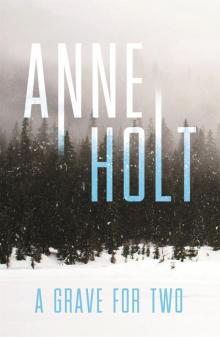 A Grave for Two
A Grave for Two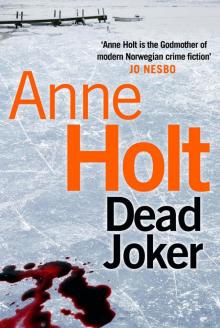 Dead Joker
Dead Joker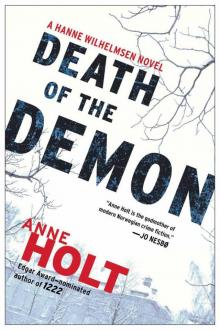 Death of the Demon: A Hanne Wilhelmsen Novel
Death of the Demon: A Hanne Wilhelmsen Novel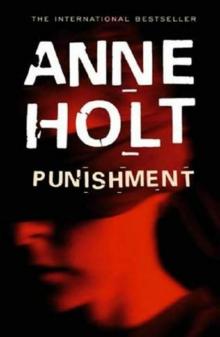 Punishment aka What Is Mine
Punishment aka What Is Mine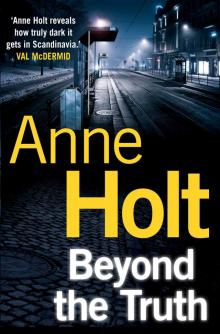 Beyond the Truth
Beyond the Truth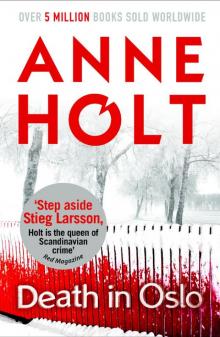 Death in Oslo
Death in Oslo The Blind Goddess
The Blind Goddess What Never Happens
What Never Happens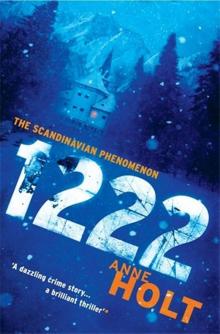 1222
1222 In Dust and Ashes
In Dust and Ashes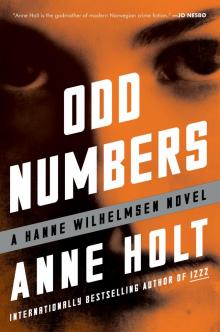 Odd Numbers
Odd Numbers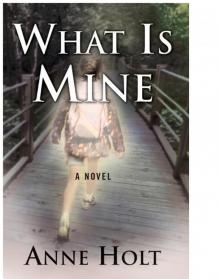 What is Mine
What is Mine What Dark Clouds Hide
What Dark Clouds Hide Blessed Are Those Who Thirst
Blessed Are Those Who Thirst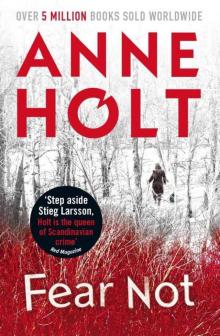 Fear Not
Fear Not No Echo
No Echo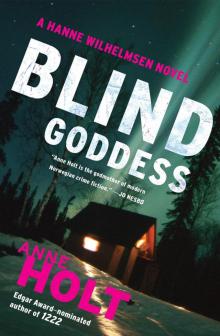 Hanne Wilhelmsen - 01 - The Blind Goddess
Hanne Wilhelmsen - 01 - The Blind Goddess